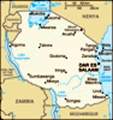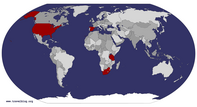Advertisement
Published: October 16th 2018
Before arriving in Tanzania, I completed an involved personality test. There were 28 characteristics that, after escaping from a vortex of multiple choice, were ranked in order from “most prevalent” to “least prevalent.” Among my top 5 were traits in leadership, discipline, vigilance, curiosity, zest and a category that struck me as interesting: fairness and equity.
I was classified, among other things, as a “make-righter.” In other words, I want things to be equally divided and put into reciprocating boxes to make sure everyone gets what’s theirs. Knowing that debts are left unpaid, gifts have gone ungiven, or “I love yous” have not been returned leaves me with ethical anxiety. We don’t steal, we don’t lie, we don’t cheat, and we sure as sh*t pay each other back for the fifty cents I found in your car under the seat and used as an investment toward my Starbucks latte without telling you.
Guilt. For days. Everything is accounted for, and knowing that others get theirs means that I also get mine.
Because I must get mine. So, isn’t that interesting? Fairness and equity are extremely important qualities, but
I wonder how often they are used altruistically. How often do we truly battle for fairness and equity if we don’t have a fear that we won’t
get ours? When we pay each other back, or give a gift, how often has that tiny, ugly thought run through our minds, “well, did she bring something last time?” or “yeah, but he was late to pay me back yesterday, so I don’t have to stress about it..”
It’s not that we’re evil. The argument can be made that the end matters more than the means. As in, an act of politeness or fairness is a
good thing regardless of the motivation. For the majority of people, our “goodness” is functioning pretty well. At least well enough to maintain our transactional society.
There's the catch.
When you break down how we feel about fairness, equity, and (depending on the issue at hand) justice, it’s often selfishness in a super-hero’s cape. We choose issues about which to be passionate based on our personal interests, or at least based on the personal interests of the group with whom we’d like to identify most. Politically, emotionally,
socially, we are capitalists. If you’re capitalizing on the feel-goods of a full pocket, or the feel goods of being known as progressive, you’re probably still capitalizing. We choose our investments wisely, with deliberate knowledge of the return.
To an extent, this is the nature of animal interaction, even in well-functioning symbiotic relationships (it’s a shame we don’t have more of those). However, if we strip the cape off of valuing “fairness” we do have an opportunity to stretch our scarcity complex.
Allow me to come back around to Peace Corps. It took a little while for me to realize how privileged I am (I’m still working on being a woke white girl, but I’m learning every day). I am extremely fortunate. Living here has taught me that I am the little sister to countless communities of stand-up individuals. Each of my families has helped raise me to the woman that stepped off the plane in Tanzania, and has supported me in my arrival to the woman I will be when I step onto American soil next spring. You all give. You give, give, give, give, and I
can’t do anything to pay it back except try to keep doing that job that I signed up for anyways. I can’t make it fair, or equitable, or just. On top of my endless list of parents, sisters, and brothers Stateside, I live in a village where everyone gives. All the time. I eat with a family who has less food than me, and they still send me home with full bushels of bananas from their tree. I trade a mere lollipop for a bag of tri-colored cherry tomatoes that would cost me $6 at Whole Foods (But shout out to Whole Foods, though, that place is LIT). I am offered directions from a bus-stand mama who’s son I just cursed out in Swahili. I have unlimited help for any chore or errand in exchange for a lesson on baking
my favorite cookies. The local bus conductor digs seatbelts out of crusty leather and physically straps me in, even when my last-minute demand has made everyone else late. It’s 11am and I just finished coffee from a care package. I’m sitting on my happy ass writing a blog while every single person in this village is hard at
work. I do nothing in comparison to what this village does to keep me comfortable. 85 percent of the time, I have learned to be okay with feeling a little useless.
“Fairness and equity? Take that hypocrisy and put where the sun don’t shine, homegirl.” That’s uncomfortable. It’s uncomfortable to believe in your values and then have your cape stripped away and suddenly you’re not performing transactions anymore. What’s under the cape? What happens when your definition of the word
“deserve” is turned on its head. Why are you white-knuckling this idea that everyone must get theirs.
Maybe it’s because you just want yours.
When we begin to realize that we cannot possibly operate from a place of scarcity because we have been given so darn much, the challenge lies therein. We can no longer perform transactions because every value that justified those transactions has been stripped away. In our transactional society, not everything is a good or service. We perform transactions that make us feel loved, worthy, vigilant, or useful to someone else. Sometimes what we gain is that feeling in itself, but
it's still an exchange. The transactions themselves aren’t the problem. The problem is that we research the investment first. What if you didn’t know whether you’d get a return? What if you risked it big, every day, giving things away in uncertainty? What if you lived like someone that truly believed they didn't need more? That they were, and that their lives were
enough.
I struggled with this idea for a while, not realizing why I felt such need to keep tabs and account for interactions. In moments deciding to share a precious packet of tuna, to split a bottle of wine without splitting the cost, to divide the check in half even though she ordered an extra side, or cringing that I never saw my water bucket again after lending it out—in those moments—I've returned to a quote I learned in the year before coming here.
“Everything we give away comes back ten-fold.” Every. Single. Thing. From wine to love, backrubs to buckets, and dollars to side dishes, what you give away without knowing the return will be the greatest and most sustainable investment of
all.
Stretch that uncomfortable muscle. At first, it hurts. I really don’t want to pay for dinner the second time in a row. I really don’t want to help you move furniture, especially since you were too busy to take me to the train station.
I really don’t want to tell you I love you, because you might not say it back.
I really want to get mine. Stretch it out. I…really… eghh…fine.. okay.. I LOVE YOU.”
It doesn’t hurt so bad once it’s gone. You don’t really miss it, do you? There’s still enough, isn’t there? There’s always enough to give a little bit more.
Give. Just give without knowing the return. Give for the sake of someone else’s benefit. Give without the guarantee that you’ll be loved by others, or even by God. Give because tabs are bothersome. Because “fairness” comes from the fear of scarcity. You’re not a child fighting over a toy. Give to people and things and places that don’t interest you. Maybe even things that you don’t understand , or can’t agree
with. Give because you often don’t know how much you’re giving until the results come back to you in ten folds of effervescent minimalism. And give because white knuckles grow tired, but stretched palms can embrace.
It’s a muscle I’m still stretching. Perhaps the lesson lies in the fact that while my strongest trait was “fairness and equity,” my weakest was “self-reliance.”
My knuckles are white with irony.
May we live in love and the purity that everything we give away will be balanced by something greater than ourselves.
Now
that is a clean transaction.
Five months left,
Kate
Advertisement
Tot: 0.156s; Tpl: 0.011s; cc: 7; qc: 45; dbt: 0.0422s; 1; m:domysql w:travelblog (10.17.0.13); sld: 1;
; mem: 1.2mb














D MJ Binkley
Dave and Merry Jo Binkley
Profound thoughts
Contemplation is good for the soul.